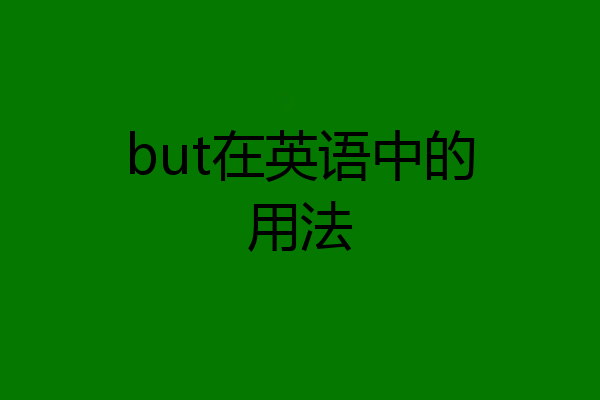
35号小祁
1. 嘿,天哪【用于回复某人,表示强烈的情感,如愤怒、惊讶等】 - But that's marvelous news! [回顾:书面语中but不用于句首] 2. 可是【用来提出异议】 - "It was a good idea." " But it didn't work." 3. 【用来加强词语或陈述的语气】 - They're rich, but I mean rich. (他们很有钱,非常非常有钱。) 4. 无论如何,反正,好【用于改变话题】 - But now to the main question.(好,现在谈主要问题。) - But tell me, are you really planning to retire?(那你告诉我,你真的打算退休吗?) 5. 【用于excuse me和I'm sorry等后面】 - Excuse me, but I'm afraid this is a no-smoking area.(对不起,这里是无烟区) 6. 词组 but then (again) 有两种意思: a) 不过,但另一方面【用于补充与之前所说内容几乎相反的陈述】 - John might be ready to help us, but then again , he might not. b) 不过【用于补充,使之前说的话不那么令人震惊】 - Dinah missed the last rehearsal, but then she always was unreliable, wasn't she?


夏小麦521
1、But作并列连词连接两个动词时,but后的动词形式,取决于but之前的形式。例如:
The purpose of the scheme is not to help the employers but to provide work foryoung people.
此计划的目的不是帮助雇主,而是为年轻人提供工作。
2、当not?but作为并列连词引导的状语时,but后的动词必须用带to的动词不定式。例如:
I have come here not as an engineer,but to learn from you.
我不是作为工程师来这里的,我是来学习的。
3、当not only?but(also)作为并列连词时,but后的动词形式须与not only后的动词形式一致。例如:
He not only said it but did it.他不仅说了,而且也做了。
4、在cannot but,cannot(help/choose)but等表示“不得不”、“只能”的成语结构中,but后动词用原形。例如:
We cannot but agree.我们只得同意。
5、在do nothing(everything/anything)but之类的结构中,but后往往用不带to的动词不定式。
They did nothing but complain.他们除了抱怨,啥事也不做。
6、在含有nothing,but的结构中,如果谓语动词为及物动词want,desire等,but后必须用带too的动词不定式。
He wanted nothing but to stay there.除了呆在那里,他什么也不想。
扩展资料:
but
英 [bət , bʌt] 美 [bət , bʌt]
conj.而;相反;然而;尽管如此;表示歉意时说
prep.除了;除?之外
adv.只有;仅仅
n.借口;推辞
双语例句:
This is but one of the methods used to try and get alcoholics to give up drink.
这只是为让那些酗酒者戒酒所尝试的方法之一。